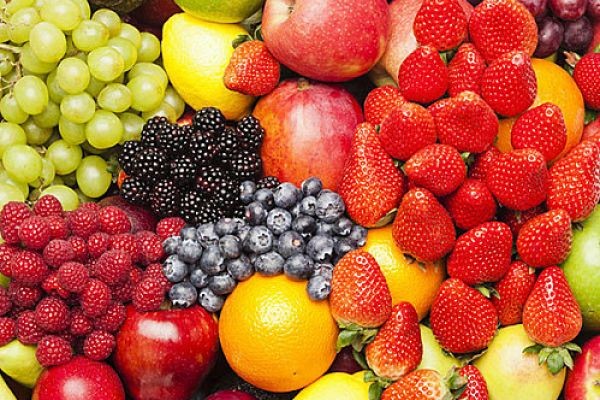What Are Fruits?
Fruits are the edible products of flowering plants that contain seeds, and they often develop from the ovaries of flowers after fertilization. Fruits vary widely in shape, size, and taste, but they all share one common trait: they are naturally sweet or tangy, making them incredibly appealing as snacks, desserts, and ingredients in both savory and sweet dishes.
The Health Benefits of Eating Fruit
Eating a variety of fruits offers numerous health benefits. Here are just a few reasons to make fruits a part of your daily diet:
-
Rich in Nutrients: Fruits are loaded with vitamins, such as vitamin C, vitamin A, and folate, as well as minerals like potassium and magnesium. These nutrients help support the immune system, promote healthy skin, and contribute to overall well-being.
-
High in Fiber: Many fruits are rich in dietary fiber, which aids digestion, helps maintain a healthy weight, and lowers the risk of certain chronic diseases like heart disease and type 2 diabetes.
-
Antioxidant Powerhouses: Fruits such as berries, citrus fruits, and grapes are packed with antioxidants, which help fight oxidative stress and protect the body against cellular damage. These compounds may also play a role in reducing inflammation and preventing chronic diseases.
-
Hydration: Many fruits, such as watermelon, oranges, and strawberries, have a high water content, making them an excellent choice for staying hydrated.
-
Natural Sweetness: Fruits provide natural sugars like fructose, which are much healthier alternatives to refined sugars. This natural sweetness can satisfy sugar cravings while offering the body beneficial nutrients.
Popular Types of Fruits
Fruits come in a variety of forms, from juicy and tropical to crisp and tangy. Here's a look at some of the most common types of fruits:
-
Citrus Fruits: Known for their tangy and refreshing taste, citrus fruits are rich in vitamin C and antioxidants. Common examples include oranges, lemons, limes, grapefruits, and tangerines.
-
Berries: Berries are small, juicy fruits known for their vibrant colors and high antioxidant content. Popular varieties include strawberries, blueberries, raspberries, blackberries, and cranberries.
-
Tropical Fruits: These fruits are typically grown in warm climates and offer exotic flavors. Common tropical fruits include mangoes, pineapples, papayas, kiwis, and coconuts.
-
Stone Fruits: Stone fruits, or drupes, contain a large pit or "stone" in the center. These fruits are sweet, juicy, and perfect for snacking. Examples include peaches, cherries, plums, apricots, and nectarines.
-
Pomes: Pomes are fruits that have a core containing seeds, such as apples and pears. These fruits are crisp, refreshing, and come in a variety of flavors, from tart to sweet.
-
Melons: Melons are large, juicy fruits with a high water content, making them perfect for hydration. Popular melons include watermelon, cantaloupe, and honeydew.
-
Exotic Fruits: There are many exotic fruits that offer unique flavors and textures, such as dragon fruit, lychee, pomegranate, and guava. These fruits are often used in smoothies, salads, and desserts.
How to Enjoy Fruits
Fruits are incredibly versatile and can be enjoyed in many ways:
-
Fresh: Many fruits are delicious when eaten fresh, making them perfect as snacks, breakfast toppings, or additions to salads.
-
Smoothies: Blending fruits with yogurt, milk, or juice creates a nutritious and filling beverage, perfect for breakfast or a mid-day snack.
-
Desserts: Fruits can be the star ingredient in a variety of desserts, such as fruit tarts, pies, sorbets, and fruit salads.
-
Cooking & Baking: Fruits like apples, pears, and peaches are often used in savory dishes like salads, roasted dishes, or even chutneys. They also make a great addition to baked goods like cakes, muffins, and crisps.
-
Juices: Freshly squeezed fruit juice is a refreshing way to enjoy the natural flavors of fruits. You can mix different fruits together to create unique juice combinations.
Seasonal Fruits and Local Varieties
Eating seasonal and locally grown fruits is not only good for the environment but also provides the best flavors and nutritional benefits. Fruits harvested at the peak of their season are often more flavorful and packed with nutrients. Here’s a general guide to some seasonal fruits:
- Spring: Strawberries, cherries, apricots, and rhubarb.
- Summer: Watermelon, peaches, nectarines, blueberries, and plums.
- Fall: Apples, pears, pomegranates, grapes, and figs.
- Winter: Oranges, grapefruits, kiwis, and persimmons.
The Environmental Impact of Fruit Production
While fruits are a healthy choice for our diets, it's important to consider their environmental impact. Some fruits are grown in specific climates and may need to be transported over long distances, which can contribute to carbon emissions. To reduce your ecological footprint, try to purchase local, organic, and seasonal fruits when possible. Supporting sustainable farming practices also helps protect the environment while providing fresh, high-quality produce.
Conclusion: A World of Flavor and Health
Fruits are more than just a delicious treat—they’re a powerhouse of nutrients that support overall health and well-being. Whether enjoyed fresh, blended into smoothies, or used in baked goods, fruits offer endless possibilities for creativity in the kitchen. With so many varieties to choose from, there's always something new to try, and incorporating a wide range of fruits into your diet is an easy and enjoyable way to improve your nutrition.
So, next time you’re looking for a snack or dessert, reach for a piece of fruit and savor the natural sweetness and health benefits it provides. From the crunch of an apple to the juiciness of a watermelon, fruits are a timeless and essential part of our daily lives.










